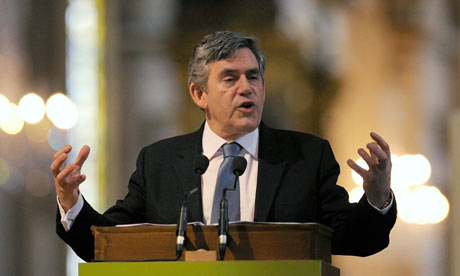G20 leaders get OECD warning that global trade is in freefall
• Thinktank rejects Gordon Brown's fiscal stimulus package
• Germany and Japan see unemployment soar
• World Bank announces new $50bn programme
- guardian.co.uk, Tuesday 31 March 2009 17.14 BST
-
 larger | smaller
larger | smaller - Article history

Prime minister Gordon Brown addresses faith leaders at St Paul's Cathedral in London, ahead of the G20 summit in London. Photograph: WPA Pool/Getty Images
World leaders gathering for Thursday's G20 summit in London were warned today by the Organisation of Cooperation and Development that the world economy was shrinking much faster than previously thought and that global trade was in freefall.
The Paris-based thinktank also told the British prime minister, Gordon Brown, there was no room for the type of fiscal stimulus that the prime minister had been touting around the world.
"The world economy is in the midst of its deepest and most synchronised recession in our lifetime caused by a global financial crisis and deepened by a collapse in world trade," the OECD said in its latest twice-yearly economic forecasts.
It predicted that in spite of big cuts in interest rates around the world, fiscal stimuli and banking system bailouts, recovery would not come until 2010 at the earliest.
The organisation had warned on Monday that unemployment among its 30 rich nation members was likely to rise by 25m in the current crisis.
Japan and Germany announced big rises in joblessness today: in Germany it rose to 3.5m, its highest since February 2008 and giving a jobless rate of 8.1%, while Japan's rate reached a three-year high of 4.4%. Japan announced a new fiscal stimulus package as it seeks to pull its economy - a big exporter punished by the slump in world trade - out of a deep recession.
Brown said G20 leaders should aim to save or create 20m jobs and must act together to increase the potential impact of their actions.
"Leaders meeting in London must supply the oxygen of confidence to today's global economy and give people in all of our countries renewed hope for the future," he said .
The OECD expects global trade volumes to slump by 13% this year. "International trade is in freefall," it said.
It expects its member economies to shrink by an average 4.3% this year, with the United States contracting by 4%, the eurozone by 4.1% and Japan by 6.6%. It forecasts Britain's economy will shrink by 3.7% - the worst performance since the second world war.
Separately, the World Bank forecast that growth in the developing world would slow to just 2.1% this year from 5.8% in 2008.
"Across the developing world, we see that conditions of recession are affecting the poorest people, making them even more vulnerable than before to sudden shocks but also reducing opportunities available to them, and frustrating their hopes," said Justin Yifu Lin, the World Bank's chief economist.
The OECD echoed comments made last week by the Bank of England governor, Mervyn King, when he said Britain's worsening budget deficit meant the government had little room to cushion the impact of the recession if it turned out to be deeper than expected.
The government said late last year it expected to have to borrow £118bn in 2009 to cover its deficit but economists now think that number will balloon to £150bn or higher, equivalent to more than 10% of gross domestic product, an all-time record.
"The room for additional fiscal manoeuvre to respond to worse-than-expected activity developments is therefore limited and new measures would need to be accompanied by detailed and credible fiscal consolidation plans in order to ensure that confidence is not eroded," the OECD said.
Until last week, Brown appeared determined to announce a new stimulus package in the 22 April budget, but he was forced to backtrack after King warned against a giveaway.
Opposition politicians have seized on King's warning to embarrass Brown as he prepares to host the G20 summit.
The OECD urged the Bank of England to hold interest rates near zero until the end of next year to support the economy. It sees a further small contraction in national income in 2010 but thinks a recovery should take hold during next year.
The World Bank president, Robert Zoellick, responded by announcing a $50bn (£35bn) programme to counter the decline in world trade.
Speaking in London, Zoellick backed the dollar as the world's main reserve currency but said he feared the world economy could stumble further into recession.
"Everyone needs to approach this crisis with a healthy dose of humility because we've seen surprises; we still face high uncertainty," he said. "It remains a dangerous year in terms of downside risks."
As US President Barack Obama set off for London, fresh figures showed US house prices were falling at their fastest pace on record. They have now lost nearly a third of their value since the 2006 peak.
This will be the first major overseas trip of Obama's presidency, during which he will hold bilateral talks with the leaders of China and Russia among others.

No comments:
Post a Comment